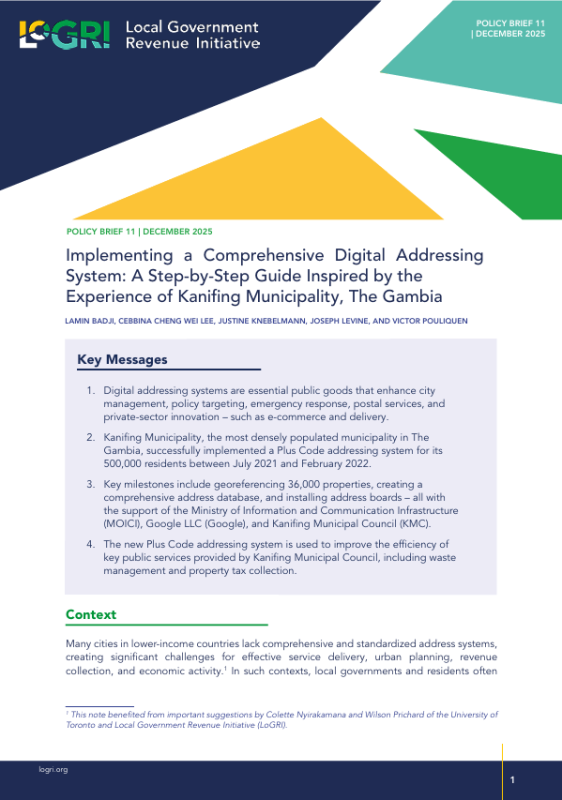Thematic Areas
In The Gambia, the eight local governments are empowered by the General Rate Act of 1992 to collect property taxes within their jurisdiction. Property taxes, known as “rates”, are an annual levy based on the market value of the property. The administration of property taxation is a shared mandate between central and local governments. Traditional authorities, referred to as ‘Alkalos,’ may play a complementary role in supporting local governments depending on existing institutional arrangements.
Illustratively, identification and registration for tax purposes are a responsibility of local governments, while property valuation and appeals fall under the purview of the Ministry of Lands, Regional Governments and Religious Affairs (MOLRG) As prescribed in the Rating Valuation Act of 1987, valuation is to be conducted every five years , free of charge, by certified valuers from the Department of Lands and Surveys within the MOLRG. Once a valuation roll is complete, it must be approved by the Ministry of Justice before coming into effect. Local governments set their own property tax rates (with approval from the MOLRG), issue tax bills, and conduct enforcement activities. Alkalos support taxpayer identification and revenue collection efforts, but the extent of this collaboration varies from council to council.
Although property valuation is relatively low-cost compared to regional standards, this affordability has not translated into the regular updating of valuation rolls. On the contrary, a shortage of certified valuers has resulted in infrequent updates, some valuation rolls being over 20 years old. The valuation challenge has led some municipalities to resort to flat rates, which can introduce major inequities in taxation, and has hindered efforts to enhance property tax revenue collection in all local governments.
Despite these difficulties, municipalities like Kanifing have introduced various reform initiatives within their powers and mandates, to enhance the efficiency and effectiveness of property taxation. Notably, Kanifing has adopted digital tools including the Matrix system which facilitate property registration, issuance of demand notices, easy tracking of payment and enforcement and a GIS-based system and database to support property identification and mapping efforts. At the central government level, there also seems to be a growing commitment to addressing valuation challenges by exploring strategies to ensure more regular valuations across all local governments.
Learn more:
- Carrasco, Jawara, and Meyer (2022): “The Effects of Fiscal Policy on Inequality and Poverty in The Gambia.” https://openknowledge.worldbank.org/server/api/core/bitstreams/f554d0bb-7034-5cc1-8d5d-394d0c20cebe/content
- McCluskey and Jibao (2017): “Chapter 13: The Gambia” in Property Tax in Africa. https://www.lincolninst.edu/publications/books/property-tax-in-africa
Featured Projects

Status: Completed
Kanifing Municipal Council Diagnostic Assessment
Research & Publications
Photo credit to Wikimedia Commons/Isaac Turay


